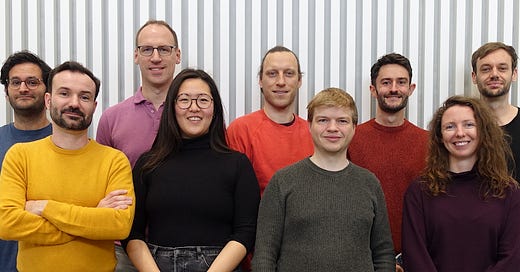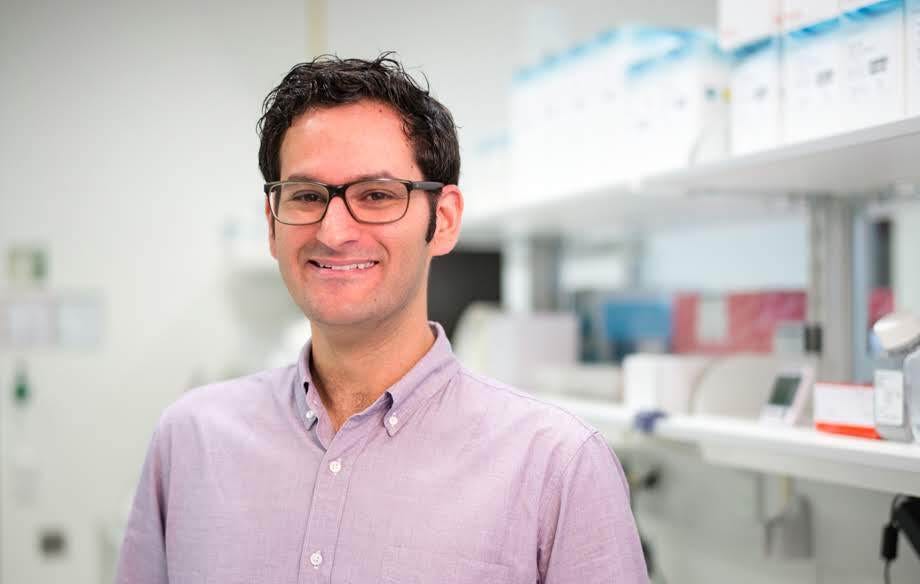Graph Therapeutics Raises $3.1M to Transform Immunological Drug Discovery with AI
A conversation with Graph CEO Greg Vladimer on precision medicine, immunology, and what it’s like to build with Merantix Capital.
I’m very excited to announce that Merantix Capital has co-led the $3.1 million pre-seed round in Graph Therapeutics, a next-generation tech bio company leveraging AI to bring precision medicine to inflammation and immunology drug discovery.
Already a seasoned entrepreneur with a tech bio exit under his belt, CEO Gregory Vladimer joined Merantix Capital in 2024 as a founder-in-residence to build his next venture with us from the earliest incubation stages.
Greg teamed with us with an eye on what he wanted to create. His last venture, Allcyte (acquired by Exscientia), utilized AI in the oncology drug discovery and precision medicine space. As Greg explains it, cancer is binary: it’s either alive or dead. Immune diseases, however, are much more complicated — you do not want to simply kill the portion of the immune system that is diseased. So when it came to what challenge he wanted to tackle with his next venture, the mission was clear: use AI and precision medicine tools on the important and unmet medical need within Immunology and inflammation diseases.
Graph’s fundraising round was also co-led by Squareone and includes participation from NAVEC Investment Management and strategic angel investors such as Mehdi Ghissassi via the Atomico Angel Program.
Greg, an American-born entrepreneur based in Vienna, recently visited us on the AI Campus in Berlin. We sat down for an interview about his background, his vision for Graph, and what this new investment means for the company.
I really like Greg’s humility and how he always puts the patient at the center of what he’s doing. Especially his last point about how, if Graph does its job with drug discovery successfully, “The patient shouldn't even notice our technological advances — they'll just experience better outcomes.”
You can read our edited conversation below:
Adrian: Can you tell me a little bit about how you became an entrepreneur and your previous venture?
Greg: I've been studying immunology since I started my PhD in 2008. Working in immunology and trying to understand how really complex diseases affect people and how we treat those has become kind of the source of a lot of my forward momentum and building within biotech and tech bio. After my postdoc in systems immunology, I started a company called Allcyte that was really dedicated to precision oncology and immuno-oncology. At Allcyte, we defined precision medicine as, “The right drug, right time, right patient,” but then very quickly that definition morphed into our ability to use precision medicine to predict how the next generation of drugs could work in the clinic for better drug discovery. After the acquisition of Allcyte by Exscientia in 2021, we really gained a lot of knowledge and first hand experience of drug discovery and development, especially through the use of AI and more scalable, disease relevant oncology model systems.
How does GraphTx build on what you were doing before — but more towards your roots in immunology?
The immune system is the makeup of an incredible number of cell types that all need to work together in an organized fashion to ward off diseases. As soon as one of these becomes dysregulated, you end up with inflammatory diseases or autoimmune diseases where you have tissue damage and systemic problems.
A lot of techbio companies are in oncology, especially younger companies, because cancer is very binary. Cancer is alive or it's dead, right? It has kind of one outcome:you want to kill off cancer. The immune system requires us to find drugs that can rebalance a lot of different cell types that are dysregulated. We don't want to kill dysregulated immune cells, because the second you kill it, you open up the patient to more infection, and that balancing requires a more global understanding of what's occurring.
So we're taking our background from the oncology and immuno-oncology days and our background from more complex modeling days, and now challenging ourselves to look at the immune system.
It sounds like that is much harder.
It is much harder!
How does AI help enable this kind of work?
The tools are now available. We've spent the better part of 10 years through Allcyte and through Exscientia building tool chains and utilizing computational and biological models, and scaling these in order to better understand oncology. Now we're at that forefront, and the ability to change over to a more complex model system is there.
Where does GraphTx fit along the chain of how a drug gets to a patient?
GraphTx begins operation at the starting point of the drug discovery value chain, where our impact can be most significant. We first focus on identifying novel targets - molecular areas in diseases where drugs could have the most beneficial effect. Through what we call multimodal perturbation modeling, we study diseases comprehensively at clinical, molecular, and genetic levels, both at baseline and under various conditions.
We then work through the value chain adding decision making data, where we can, to support the development and discovery process. As a techbio company, we leverage advanced disease modeling and high-quality data to enhance decision-making throughout the drug discovery and development pipeline. This spans from initial target discovery through pre-clinical work, including identifying patient enrichment strategies for trials. Our ultimate goal is ensuring the right patients receive the drugs we're developing or supporting.
You’re an American building in Europe. What advantages do you see here versus the US?
This is my third company that I'm building (second I’ve founded) in Europe, and what we've realized is that there's an incredible amount of untapped potential, both from the financial — where you've got a lot of investment groups who are interested in tech, bio, and biology within Europe — but more importantly is you have an incredible number of very smart, very innovative people that don't necessarily want to move to the US or UK. They're looking for good jobs and good opportunities in Europe.
Going to the US is a great opportunity for a lot of companies, but nothing has held us back so far, and I think we have been extraordinarily successful in building tech, bio, and biotech companies within Europe. My goal is to continue this EU-centric build with Graph.
You’ve now announced your $3.1 million pre-seed financing round. How is this going to help set you on your way?
Raising this much in pre-seed for a tech biocompany in Europe has been really incredible, and the support that we've received from our investors, Merantix Capital and SquareOne, has enabled us to rapidly grow. I think from the techbio point of view, it enables us to think a little bit further in advance on not just how to stay at the bleeding edge of what we're building, but then how to actually write what the bleeding edge is when it comes to disrupting drug discovery and development in immune-mediated diseases.
Ultimately, it gives us the ability to get to where we need to be for seed and get to where we need to really be to disrupt drug discovery and development faster.
If I might ask a self-serving question: How has it been working with Merantix Capital?
My relationships are mostly in biotech, so Merantix Capital opened up an incredible number of doors into the tech and deeptech sector that allowed us to really focus on what we wanted to build first - our platform. I think the personal relationships are one aspect of it, but then executing on those personal relationships and using them to your advantage is something that we would not have been able to have done had it not been for Merantix events, connections, and introductions.
Last question. What do you think drug discovery looks like in 5-10 years? Not just how the industry is transformed, but how that might impact the lived patient experience?
In 5-10 years, if we're successful in implementing AI in drug discovery, the patient shouldn't even notice our technological advances - they'll just experience better outcomes. What matters to patients is getting effective treatments with fewer side effects, delivered to the right people at the right time.
As scientists working with AI, our responsibility is to be both innovative and careful. This means gathering high-quality, purpose-specific data to train our models, and making informed decisions based on both positive and negative results that AI provides. Rather than pushing for complete AI automation of drug discovery, I envision AI being thoughtfully integrated at key decision points throughout the process, always with the patient's needs as our north star.
The impact of these decisions will be significant, which is why we must implement AI strategically and responsibly, keeping the end goal - better patient care - clearly in focus.
Thanks, Greg!






